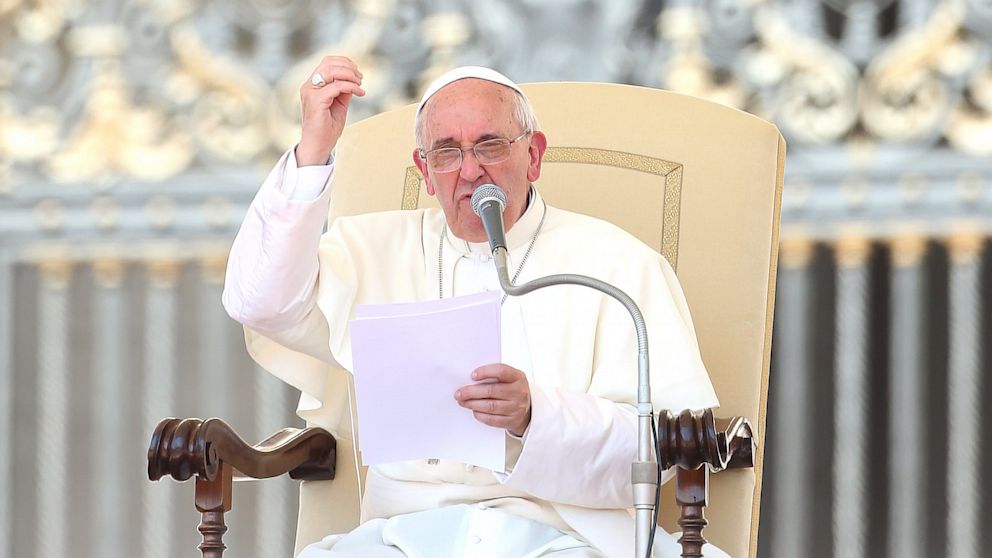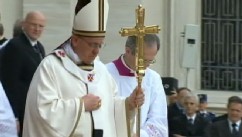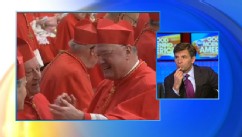By Hans-Jürgen Schlamp in Rome, SPIEGEL
July 6, 2013
It appears Pope Francis truly wants to change the Catholic Church. He's reforming the Vatican Bank first, but he's also circumventing the old guard wherever he can. The establishment is up in arms.
A cardinal in Rome earns about ?3,000 ($3,888) a month, even less than a pastor in Germany. But a cardinal's life in Rome is a lot more expensive -- with visits to restaurants and shopping at boutiques for the upscale clothing men of the church are expected to wear, not to mention their jewelry and the antiques they display in their apartments. So it's good to have friends who can treat you or otherwise provide support now and then.Friends are also happy to give a cardinal a hand -- and not just out of religious considerations. A cardinal can be helpful in both political and business terms. So it's not surprising that a symbiotic relationship between parts of the Curia and the upper class around the world has formed -- one that brings together the establishment, luxury and power. It's a nice little tradition that new Pope Francis would like to put an end to. For the Catholic establishment, though, it is nothing less than a catastrophe.
A 'Sick' Church of 'Theological Narcissism'
Instead of wearing a gold cross, he has one of steel. And he lives in a sparsely furnished apartment in the Santa Marta guest house rather than in the Apostolic Palace. Instead of taking his seat in the Vatican concert hall to listen to classical music, he recently remained at his desk working on the final version of his decree for the church-state's own Institute for Religious Works (IOR) bank. With his signature, he created a powerful special papal commission to review the bank's activities. He also said the new commission must change everything at the Vatican Bank, as it is also known. He said the Vatican certainly needed a bank, but its areas of business should only reach a "certain point."
A Papal Bank with Mafia Contacts
For decades now, the IOR has been in the headlines for one scandal after the other. At the beginning of the 1980s, it was at the center of one of the darkest crime thrillers in postwar Italian history. The scandal surrounded billions in business with the mafia, and a Vatican banker was hanged from a London bridge by a killer commando.
But the chain of scandals never let up. When, in autumn 2010, fresh suspicions of money laundering to the tune of triple-digit millions emerged, then Pope Benedict XVI promised stricter rules for his financial managers. In fact, though, nothing changed. In the so-called Vatileaks scandal, secret documents that had been smuggled out of the Vatican shed light on bizarre intrigues inside the papal state. Often, the Vatican Bank played a role in those intrigues. Benedict XVI was appalled, but also overwhelmed. He failed to prevail over the powerful cardinals who backed the IOR. His resignation was the logical outcome.
German Baron Takes Helm of Bank
His successor is taking more decisive action. First, he fired Nunzio Scarano, the top accountant in the Vatican office that oversees Vatican property and investments, after he was accused of money laundering and corruption and arrested. Then, practically overnight, he forced out IOR Director Paulo Cipriani and his deputy. Now the bank will be led by Ernst von Freyberg, a German baron and former consultant, member of the Sovereign Military Order of Malta and the president of the IOR supervisory board since mid-February.
Between now and October, Pope Francis wants to ensure clarity and also determine how the financial institute will handle its duties in harmony with the "church's mission" in the future. A that point, a new structure will be created for the bank and a new boss will be appointed.
"Did we actually vote for someone who really believes in what he preaches?" some within the Curia are now whispering. Once again, Francis has taken them fully by surprise. In an almost demonstrative manner, he has been excluding the Vatican apparatus in every way he can. Most recently, this happened with the trip the pope announced he would take on Monday to the island of Lampedusa in southern Italy. Cardinal Tarcisio Bertone, the Vatican secretary of state, first learned of the planned trip through a papal press release. And instead of the kind of months of advance-team work used by heads of the Catholic Church for trips in the past, Francis has dispensed with that. Instead, the eccentric Argentinian pope ordered his staff to prepare a plane so that he could fly there in the morning and be back by midday.
....
Taken from: http://abcnews.go.com/International/popes-reform-path-francis-shakes-church-establishment/story?id=19573297




